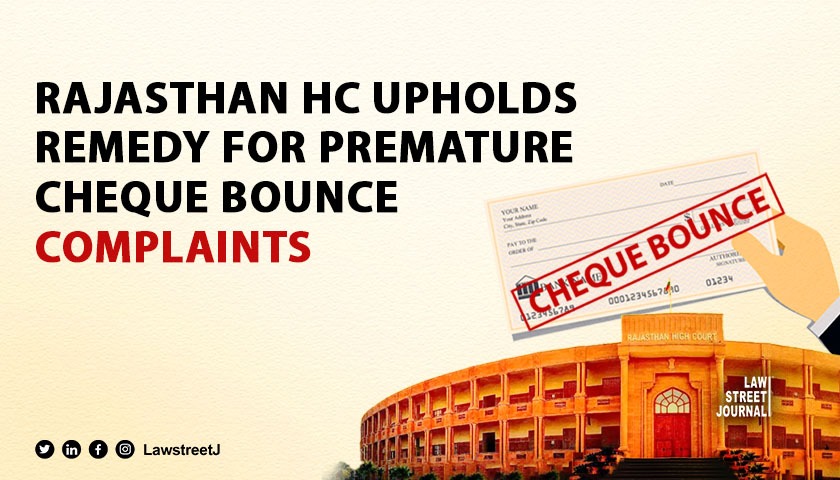Jaipur: The Single Bench of the Rajasthan High Court has upheld the right to file fresh complaints in cases of premature cheque bounce while emphasizing the fundamental legal maxim “Ubi Jus Ibi Remedium” – where there is a right, there must be a remedy.
Rajasthan High Court Ruling on Premature Cheque Bounce Cases: Key Takeaways
Justice Anoop Kumar Dhand addressed a criminal appeal against acquittal in a cheque bounce case where the complaint had been filed prematurely. The judgment provides detailed guidance on the proper interpretation of Sections 138 and 142 of the Negotiable Instruments Act, 1881.
Understanding “Ubi Jus Ibi Remedium” in Cheque Bounce Legal Disputes
The case arose from a dishonored cheque of ₹3,50,000. A legal notice was sent on August 28, 2012, and received by the accused on September 1, 2012. However, the complaint was filed on September 14, 2012, before the expiration of the mandatory 15-day notice period. While the trial court had convicted the accused, sentencing him to one year of imprisonment and imposing a ₹5,00,000 fine, the appellate court acquitted him, citing premature filing.
The High Court extensively analyzed Supreme Court precedents, particularly Yogendra Pratap Singh vs. Savitri Pandey (2015) and Gajanand Burange vs. Laxmi Chand Goyal (2022). These rulings clarify that while cognizance cannot be taken of premature complaints, complainants should be allowed to file fresh complaints within one month of the decision.
The court underscored that the object of the law is not to render complainants remediless due to technical defects. Citing the historic Ashby vs. White (1703) case, the judgment reaffirmed that where a legal right exists, there must also be a means to enforce it.
The High Court observed that allowing the drawer of a cheque to escape prosecution on the technical ground of premature filing would undermine the legislative intent of Section 138 of the Negotiable Instruments Act.
Accordingly, the judgment set aside the appellate court’s acquittal order and modified the trial court’s judgment, granting the complainant liberty to file a fresh complaint within one month. The court also directed that such delay be treated as condoned under the proviso to Section 142. Additionally, the trial court was instructed to complete proceedings within one year and return original documents to the complainant after retaining certified copies.
For the appellant: Mr. Sandeep Jain, Advocate
For the respondents: Mr. Manvendra Singh, Advocate; Mr. Surya Pratap Singh, Advocate
Case title: Moolchand vs. Bhairulal



![Women cant be denied job for not being married: Rajasthan High Court [Read Judgment]](/secure/uploads/2023/09/lj_8336_fbfe7a8f-f672-4a69-86ba-ba50c8f28544.jpg)
![Rajasthan HC denies anticipatory bail in land forgery case, cites serious charges and witness threats [Read Order]](/secure/uploads/2024/06/lj_9981_901a6837-881e-4463-8b00-9ec7461a379e.webp)
![In process of bringing in legislation to control illegal conversion, Rajasthan government tells SC [Read Affidavit]](/secure/uploads/2024/06/lj_7804_4d18824f-bf38-4bec-94a9-c9886787ad92.webp)
![Rajasthan HC slams govt over 16-Year delay in AIIMS Jodhpur Projects, Warns of Rs. 50 Crore Penalty [Read Order]](/secure/uploads/2024/12/lj_9853_Rajasthan_HC_slams_govt_for_16_year_delay_in_AIIMS_Jodhpur_Project.jpg)




